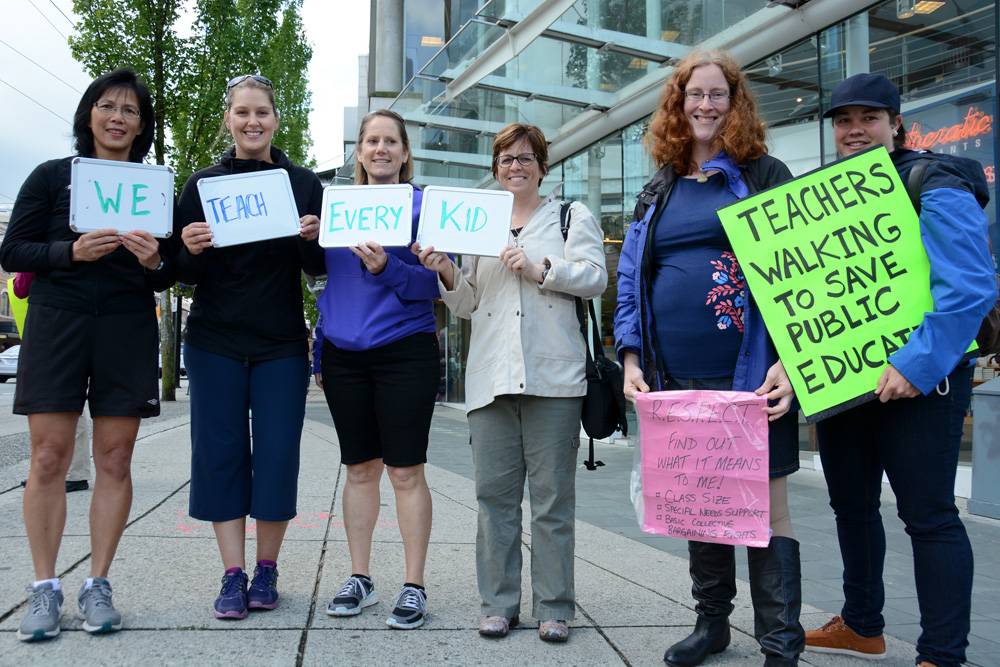“[If] the government could declare all further compromise in any context to be untenable, pass whatever it wants, and spend all ‘consultation periods’ repeatedly saying ‘sorry, this is as far as we can go,’ [that] would make a mockery of the concept of collective bargaining.” Justice Ian Donald, dissenting from the B.C. Court of Appeal decision overturning a lower court ruling that found the government’s imposed 2012 contract on B.C. teachers unconstitutional.
I’ve known Appeal Court Justice Ian Donald for a long time, not recently or as a friend, but during his time as a lawyer representing non-mainstream unions who made a lot of news in those long lost days when I was a labour reporter.
His clients included independent Canadian unions such as the Pulp, Paper and Woodworkers of Canada (PPWC) and the Canadian Association of Industrial, Mechanical and Allied Workers Union (CAIMAW). He also acted for the unorthodox, perpetually feisty United Fishermen and Allied Workers Union (UFAWU).
Back then, CAIMAW and the PPWC were thorns in the sides of the well-heeled, establishment unions. But they came to Donald early in his career, and he stuck by them. They got good value for their money. Ian Donald was one of the best of the union lawyers that flourished in those grand times before the B.C. Labour Relations Board was whittled down by labour code changes and humdrum appointments. He was also among the most dignified, respected and principled individuals I encountered during my many years on the beat.
Ian Donald was not a table-pounder. He questioned witnesses respectfully, and his meticulously reasoned arguments were not heavy on rhetoric, no matter how uphill the case. Despite representing unions with a reputation for militancy, I’m not sure I heard him whisper even a word of partisanship or express support for the often-radical posturing of his clients. He was there to defend their rights, under the law. Much to my dismay as a reporter looking for good quotes, he was as circumspect as, well, a judge.
I well remember him withdrawing once from a case involving the UFAWU, because he felt his client’s actions had compromised his integrity. The number of times he was chosen as a private arbitrator attested to the respect in which he was held by both sides. Employers knew he would give them a fair hearing and decide the issue on its merits, without tilting towards labour.
This impartiality was recognized in 1989, when he was plucked from the ranks of union lawyers and appointed to the B.C Supreme Court. Five years later, he was promoted to the B.C. Court of Appeal, where he is now the most senior of the 23 appellate court judges.
Reading Justice Donald’s strong dissent in the recent 4-1 decision by the B.C. Court of Appeal in the teachers’ case took me back to that far off age when labour was still a big deal, and reporters such as myself were lucky enough to cover people like Ian Donald and other skilled practitioners of labour law.
Over 38 pages, almost certainly aimed at providing reasons for the Supreme Court of Canada to hear the matter, Justice Donald provided a ringing defense of free collective bargaining and the way it should work.
His assessment of the case could not have been more different from his four judicial colleagues, who overturned the decision by B.C. Supreme Court Justice Susan Griffin early last year that the province’s Bill 22, imposing yet another contract on B.C. teachers, was unconstitutional. Indeed, they took her to the judicial equivalent of the woodshed for a legal whacking, citing error after error in her finding that the government failed to bargain in good faith during five months of “consultations” with the BCTF in 2012 before passing Bill 22. The government’s legislated contract did not include a whiff of the negotiated classroom working conditions — class size and class composition — which Justice Griffin had ordered restored in an earlier court judgment.
That order arose from her judgment in 2011 that the Liberals’ ham-fisted, unilateral stripping of those working conditions in 2002 contravened the teachers’ Charter Rights to free collective bargaining. Judge Griffin was so disturbed by the government’s failure to take her order with sufficient seriousness, she assessed the province $2 million in damages. (Follow the bouncing judgments…)
The four appellate judges skewered just about every aspect of Judge Griffin’s bold ruling. The government won big time. As veteran Vancouver Sun columnist Vaughn Palmer put it: “The B.C. Liberals could not have asked for a more satisfying verdict.”

Inevitably, given the headline news that the province won, and the teachers lost, Justice Donald’s dissenting opinion got rather lost in the shuffle. I thought it so impressive, however, I’ve resurrected some of it for my humble blog. And believe me, my whittling down of his reasons is a pale shadow of his well-reasoned opinion. But here are a few highlights from Justice Donald’s lonely finding that Justice Griffin was mostly right in her assessment of the long-running dispute. (The full Appeal Court ruling is here. Justice Donald’s dissent begins on page 81.)
1. His judicial colleagues erred, Judge Donald wrote, by disregarding her “key findings of fact” about the government’s lack of good faith in trying to reach a deal with the teachers. He pointed out she reached her conclusion after 29 days of evidence and more than three years of submissions grappling with the devilish issue of class size and class composition. Her findings should not be trumped by the appeal court’s own version of the facts, he said, unless she had made “such palpable and overriding errors of fact that [her] conclusion cannot stand.” She did not make such errors, Justice Donald concluded. “An appeal is not an opportunity for a de novo hearing or an attempt to roll the dice again with potentially more sympathetic judges.”
2. Good faith negotiations should include meaningful dialogue, said Justice Donald. “Parties must honestly strive to find a middle ground.” Repeatedly saying ‘this is as far as we can go’ makes a mockery of the concept of collective bargaining, he added. Introduced as a substitute for the lost classroom working conditions, the province’s three-year, $165 million Learning Improvement Fund seemed to impress the other appeal court justices. It didn’t cut much ice with Justice Donald. Why? It was the government’s refusal to even consider restoring those conditions to the teachers’ contract that forced the BCTF to give them up and accept the LIF, he said.
3.Justice Donald re-affirmed Justice Griffin’s conclusion that the province entered consultations with its mind made up and a strategy in place, up to provoking a strike that might turn the public against the teachers. “Any disagreement or negotiation on the part of the union was futile; the die was cast,” he said. “Good faith negotiation requires parties to explain their position and read and consider the positions of opposing parties. The Province failed to meet this minimum standard.”
4. The crux of the case is whether the government made enough of an effort to reach a deal with the teachers, before throwing up their hands and imposing a settlement. Passing legislation to resolve an impasse is permitted by the Charter, Justice Donald noted, provided a government “negotiates or consults with an association in good faith.” Justice Griffin determined the province had no intention of restoring any form of classroom limits, despite her 2011 order. She had given the parties a year to work something out. Instead, said Justice Donald, the province saw the problem as merely procedural: it could renew the legislation, so long as it engaged in a “consultation” period. “The BCTF, after years of having their right to collectively bargain over Working Conditions rendered futile by the Province’s actions, was confronted with an intention to maintain the status quo. He continued: “In essence, the Province was informing the union that it intended to keep the door shut on the subject of Working Conditions, but it would allow the union to have input on exactly what kind of door would be used.”
5. Justice Donald didn’t agree with Justice Griffin on everything. He thought her $2 million fine was unwarranted. But he was in her corner on the basic remedy. The current situation leaves “teachers at an unfair disadvantage due to egregious and unconstitutional government conduct,” Justice Donald found. “This case is the culmination of at least 13 years of systemic and institutionalized negation of the BCTF’s [Charter] right to associate collectively to achieve important workplace goals….[I would] direct the reinstatement of the working conditions into the collective agreement immediately.”
Goodness knows, outside of its supportive membership, the B.C. Teachers’ Federation is hard to love. Warm and cuddly the union is not. Given the way they are depicted in much of the media and among segments of the public as a militant pain in the neck, it’s difficult to think of the BCTF and the province’s 40,000 teachers as hard done by.
But consider: for 13 years, they have been without legally negotiated classroom working conditions unilaterally and untimely ripped from the womb of their contract in direct violation of the Canadian Charter of Rights and Freedom. Not even the current Liberal government disputes the court ruling that found Gordon Campbell’s crew acted illegally by running roughshod over the teachers’ right to meaningful collective bargaining when they did that in 2002.
Whatever one thinks of those clauses, the teachers had a legal right to them. Yet, here it is 2015, and, except for a $105 million grievance fund from the government, they remain with nothing to show for the government’s illegal legislation. It’s not the clauses themselves, its the principle. Here’s hoping the Supreme Court of Canada settles this thing once and for all.
In the meantime, thank you, Mr. Justice Ian T. Donald, for writing such a persuasive defence of free collective bargaining, however it is received by the SCC.
Image: Flickr/BCGovPhotos



